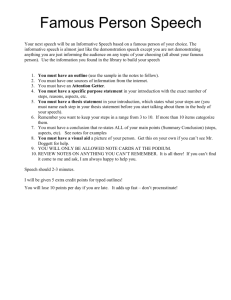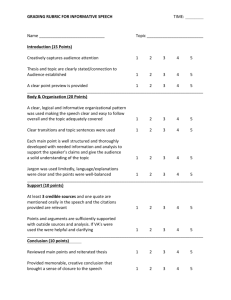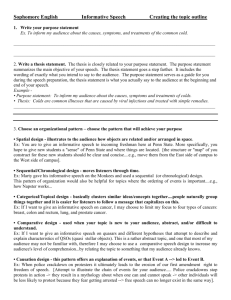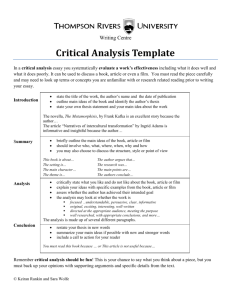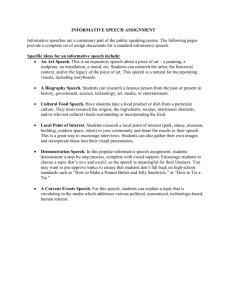Informative Speeches
advertisement
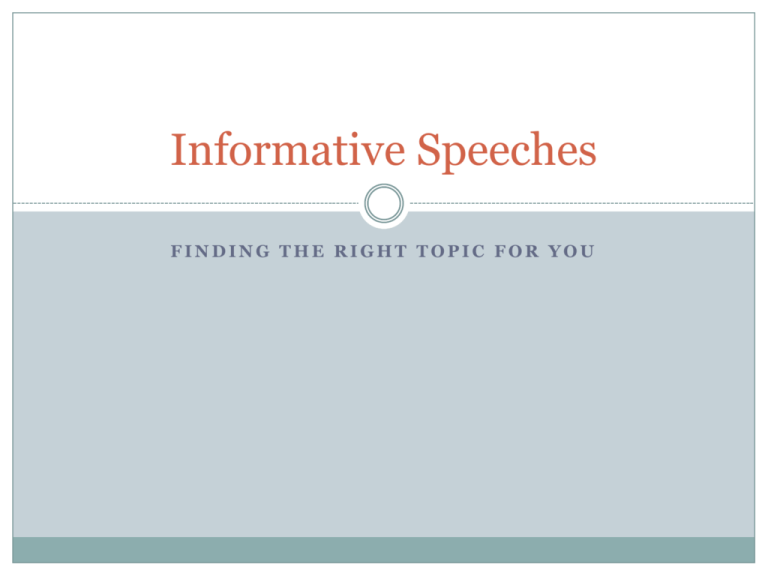
Informative Speeches FINDING THE RIGHT TOPIC FOR YOU Exploring Topics Write down as many answers as you can about the following questions: 1. What do you like to do in your spare time? 2. What are your hobbies? (Or what hobbies have you had?) 3. What do you like to do during holidays? 4. What is your favorite travel destination? 5. What do you like to talk about with friends? (Gossip? Go ahead and say so!) 6. On what issue do you hold a strong opinion? 7. What issue would you like to know more about? 8. What kinds of values do you stand for? (Even if you feel like answering this sets you up to label yourself, go ahead and write down a quick answer.) 9. What special expertise do you have? 10. What special skills do you have? 11. What professional or personal experiences have you had in your life? 12. What current topic or debate in the news has grabbed your attention? 13. What is your greatest pet peeve? 14. What makes you very happy? Too Broad-Narrowing Our Focus One thing we can do to help ourselves gain some focus is to use an association method. What happens with this method is that we simply identify a topic and think about any number of subtopics that could logically fall under that category. 1. 2. 3. 4. Computers _______________ _______________ _______________ _______________ Take a couple of seconds to look over the list of responses you generated when I asked you to answer my list of 14 questions. Circle the entry/topic that seems most interesting to you at this moment. Complete the same association method on this topic that we just did with computers. 1. 2. 3. 4. _______________ _______________ _______________ _______________ Narrowing Our Focus So, let’s talk about how you might transform one of the potential speech topics in front of you into an actual speech topic proposal that could work very well for a potential informative speech. First, we are going to identify informative goals and strategies. Then we are going to work at crafting focused thesis statements. Informative Goals and Strategies 1. To communicate information accurately. 2. To communicate information clearly. 3. To make information meaningful and interesting to the audience. Goals In order to intentionally inform, consider these three goals: 1. Providing new information or perspective a. Enrich an audience’s common knowledge on a subject or issue b. Update and revise common knowledge 2. Setting an agenda a. Create an awareness about an unknown or unfamiliar subject b. Focus attention on a topic that is typically ignored 3. Creating a positive or negative feeling a. Empower listeners to feel better about their ability to take control of a situation b. Or cause listeners to sense discomfort about a situation that might lead them to think about a subject in a different way How can identifying one of these three goals help you in narrowing the focus of your potential speech topic? Strategies to Achieve the Goals 1. DEFINING clarifies a term or concept that is vague required when the concept is not clear (technical information) 2. REPORTING tells what happened with little-to-no analysis tell what you saw or read 3. DESCRIBING giving details to create a picture useful for helping listeners visualize what you are talking about (familiar situation) 4. EXPLAINING goes beyond definition and reporting to explain why and how something happened 6. COMPARING clarifies something for the audience based on similarities and differences Narrowing Topics Topic General Purpose Thesis Main Points of the Body of the Speech Specific Purpose Statement Your topic is in very general, broad terms, what you will speak about. 3 Causes of cancer Your general purpose will either be: to inform, to persuade, or to entertain To inform Your specific purpose statement will merge together your topic and general purpose e.g., to inform my audience about _________(topic) to inform my audience about 3 causes of cancer Narrowing Topics Topic General Purpose Thesis Main Points of the Body of the Speech Specific Purpose Statement Your thesis states your specific purpose statement in declarative sentence form. e.g., There are ________ _________ of ________________. There are three causes of cancer. From your thesis statement, it should be apparent as to what the main points of the body will be. I. Smoking can lead to cancer. II. Environmental conditions can lead to cancer. III. Eating habits can lead to cancer.
